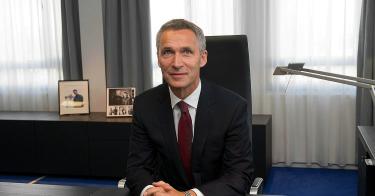Jens Stoltenberg's term as NATO Secretary General expires next September. Who will replace him?
With back-to-back crises on NATO’s frontier in Belarus and Ukraine, that question looms especially large now. And the challenges won’t get any easier.
China is becoming a much bigger issue for the alliance. For instance, Beijing is trying to drum up a European boycott to punish NATO-member Lithuania for policies the Chinese Communist Party doesn’t like.
So, who wants to step into Stoltenberg’s shoes? Lots of folks. And the smart bet is that anyone soft on either Russia or China won’t get the nod.
It’s no secret that the U.K. wants the top NATO job. According to The Times, London would love to see former Foreign Secretary William Hague take the post (though sources say Hague is not interested). Another candidate mentioned is former Prime Minister Theresa May. Both have been tough on Russia but not so tough on China.
For example, earlier this year, May wrote, “It would be a mistake to allow this [China] to become a fault line in international relations…. The U.K. will always have a special relationship with the U.S. But that has never stopped us from having diplomatic and trading relationships with others….” That view seems so out of touch with where the alliance needs to go.
Aside from needing better candidates, the U.K. has another problem: Paris will likely oppose British ambitions. Still smarting over the AUKUS submarine deal and wanting to prop up its own inflated status in European affairs, French support for a new Secretary General may be wielded with the express purpose of frustrating London’s goals.
What about Italy? Rome and Paris have recently strengthened relations, signing the Quirinale Treaty. Italy has only had one NATO Secretary General (Manlio Brosio, from 1964 to 1971), while the United Kingdom has had three. Two names circulating in Italy are Federica Mogherini, the former High Representative of the European Union for Foreign Affairs, and Lorenzo Guerini, the current Italian Minister of Defense. Last July, Politico also mentioned the name of the current Secretary of the Italian Democratic Party, Enrico Letta.
Mogherini looks like a non-starter. She is too soft on China. For example, speaking in Beijing in 2017, she declared, “The European Union and China share the view of a global order based on multilateralism and on the UN system: our cooperation has never been so important….” Comments like that make it doubtful the current government would raise a finger to press her candidacy
Enrico Letta’s prospects aren’t much better. He is a staunch supporter of a political alliance between his party and the pro-Chinese 5 Star Movement.
In contrast, Guerini is one of the most pro-U.S. members of the current Italian government. In recent months, he has expressed a healthy wariness of both Russia and China.
Southern Europe constantly complains NATO doesn’t give enough attention to the Southern Flank. An Italian pick would help address that.
Estonian President Kersti Kaljulaid has also been floated as one of the potential successors. She is tough on Russia, realistic on China, and pro-U.S.. A few months ago, some fretted that having a NATO secretary general from the Baltics would be too in-your-face for Putin at a time when Biden was trying to better relations with Moscow. But after the dust-up on Ukraine and Belarus, there might be more consensus for sending this kind of signal. The names of former Croatian President Kolinda Grabar-Kitarovic and former Lithuania President Dalia Grybauskaite have also been thrown into the mix.
In the coming months, what might really shake up this race is the geo-political ramifications of the current crises on NATO’s borders and an increasingly aggressive and intrusive China. As tensions continue to mount, the likelihood increases that the candidate who gets the white smoke for NATO’s top job will have a record of taking seriously the threats posed by both Moscow and Beijing.




